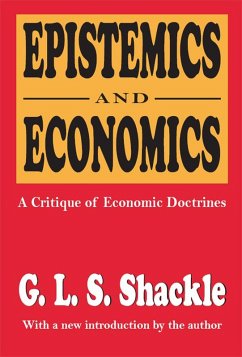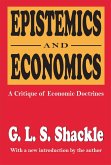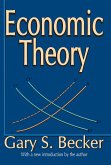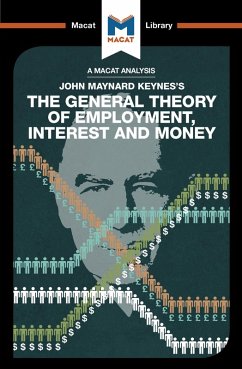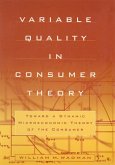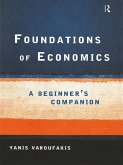45,95 €
45,95 €
inkl. MwSt.
Sofort per Download lieferbar

23 °P sammeln
45,95 €
Als Download kaufen

45,95 €
inkl. MwSt.
Sofort per Download lieferbar

23 °P sammeln
Jetzt verschenken
Alle Infos zum eBook verschenken
45,95 €
inkl. MwSt.
Sofort per Download lieferbar
Alle Infos zum eBook verschenken

23 °P sammeln
- Format: ePub
- Merkliste
- Auf die Merkliste
- Bewerten Bewerten
- Teilen
- Produkt teilen
- Produkterinnerung
- Produkterinnerung

Bitte loggen Sie sich zunächst in Ihr Kundenkonto ein oder registrieren Sie sich bei
bücher.de, um das eBook-Abo tolino select nutzen zu können.
Hier können Sie sich einloggen
Hier können Sie sich einloggen
Sie sind bereits eingeloggt. Klicken Sie auf 2. tolino select Abo, um fortzufahren.

Bitte loggen Sie sich zunächst in Ihr Kundenkonto ein oder registrieren Sie sich bei bücher.de, um das eBook-Abo tolino select nutzen zu können.
It is Shackle's view that human conduct is chosen with a view to its consequences. But these are in the future, which cannot be directly known. Expectation will confine itself to what is deemed possible, but this leaves it free to entertain widely diverse and rival hypotheses. How can such skeins of mutually conflicting ideas serve the formation of individual or institutional policy? This is the chief question this book examines.
- Geräte: eReader
- mit Kopierschutz
- eBook Hilfe
- Größe: 2.46MB
Andere Kunden interessierten sich auch für
![Epistemics and Economics (eBook, PDF) Epistemics and Economics (eBook, PDF)]() G. L. S. ShackleEpistemics and Economics (eBook, PDF)45,95 €
G. L. S. ShackleEpistemics and Economics (eBook, PDF)45,95 €![Economic Theory (eBook, ePUB) Economic Theory (eBook, ePUB)]() Gary BeckerEconomic Theory (eBook, ePUB)51,95 €
Gary BeckerEconomic Theory (eBook, ePUB)51,95 €![The General Theory (eBook, ePUB) The General Theory (eBook, ePUB)]() The General Theory (eBook, ePUB)45,95 €
The General Theory (eBook, ePUB)45,95 €![The General Theory (eBook, ePUB) The General Theory (eBook, ePUB)]() The General Theory (eBook, ePUB)55,95 €
The General Theory (eBook, ePUB)55,95 €![An Analysis of John Maynard Keyne's The General Theory of Employment, Interest and Money (eBook, ePUB) An Analysis of John Maynard Keyne's The General Theory of Employment, Interest and Money (eBook, ePUB)]() John CollinsAn Analysis of John Maynard Keyne's The General Theory of Employment, Interest and Money (eBook, ePUB)7,99 €
John CollinsAn Analysis of John Maynard Keyne's The General Theory of Employment, Interest and Money (eBook, ePUB)7,99 €![Variable Quality in Consumer Theory (eBook, ePUB) Variable Quality in Consumer Theory (eBook, ePUB)]() W. M. WadmanVariable Quality in Consumer Theory (eBook, ePUB)45,95 €
W. M. WadmanVariable Quality in Consumer Theory (eBook, ePUB)45,95 €![Foundations of Economics (eBook, ePUB) Foundations of Economics (eBook, ePUB)]() Yanis VaroufakisFoundations of Economics (eBook, ePUB)37,95 €
Yanis VaroufakisFoundations of Economics (eBook, ePUB)37,95 €-
-
-
It is Shackle's view that human conduct is chosen with a view to its consequences. But these are in the future, which cannot be directly known. Expectation will confine itself to what is deemed possible, but this leaves it free to entertain widely diverse and rival hypotheses. How can such skeins of mutually conflicting ideas serve the formation of individual or institutional policy? This is the chief question this book examines.
Dieser Download kann aus rechtlichen Gründen nur mit Rechnungsadresse in A, B, BG, CY, CZ, D, DK, EW, E, FIN, F, GR, HR, H, IRL, I, LT, L, LR, M, NL, PL, P, R, S, SLO, SK ausgeliefert werden.
Produktdetails
- Produktdetails
- Verlag: Taylor & Francis eBooks
- Seitenzahl: 495
- Erscheinungstermin: 29. September 2017
- Englisch
- ISBN-13: 9781351311625
- Artikelnr.: 49377672
- Verlag: Taylor & Francis eBooks
- Seitenzahl: 495
- Erscheinungstermin: 29. September 2017
- Englisch
- ISBN-13: 9781351311625
- Artikelnr.: 49377672
- Herstellerkennzeichnung Die Herstellerinformationen sind derzeit nicht verfügbar.
G. L. S. Shackle
THEORY AND THE SCHEME OF THINGS ENTIRE
1. Economic Theory and the Formal Imagination
2. Time
novelty
geometry
3. Self-subsistent and non-self-subsistent sciences
4. Valuation
variety and scalar quantity
5. Formal codes and their efficiency
6. Orientations
7. Reason versus knowledge
BOOK II. THE RISE OF THE RATIONAL IDEAL
8. The construct of reason
9. Subjective marginalism
10. The concept of value
11. Quantity versus form
12. The rational ideal as the core of economic theory
13. Cost and the meaning of choice
14. Perfect competition and conceptual illusionism
15. The value-construct in the round
BOOK III. THE DISSOLUTION OF THE RATIONAL IDEAL
16. Expectation: the dissolution of determinacy
17. Chapter 2 of the General Theory: two entrances for involuntary unemployment
18. Kaleidic investment-values
19. Lender's uncertainty and the nature of interest-rates
20. Liquidity: its nature
21. Prices as convention
22. The dissolution of rational determinacy
BOOK IV. STATICS: THE REJECTION OF TIME
23. The calculus and the subjective ideal
24. Simultaneous equations and the market ideal
25. Partial equilibrium
26. The rejection of time
BOOK V. DIACHRONISM: THE ARTEFACT OF TIME
27. Diachronism: the assimilation of time to space
28. Marshall's accommodation of time
29. Capital
or the time-net of production
30. Business cycle engines
31. History
theory and world-picture
32. The sovereignty of theory
BOOK VI. EPISTEMICS VERSUS AXIOMATICS
33. The science of imprecision
34. Languages for expectation
35. Profit
36. Game theory's exclusion of tactical surprise
37. Kaleidic economics
38. Economic theory unbound
Index
1. Economic Theory and the Formal Imagination
2. Time
novelty
geometry
3. Self-subsistent and non-self-subsistent sciences
4. Valuation
variety and scalar quantity
5. Formal codes and their efficiency
6. Orientations
7. Reason versus knowledge
BOOK II. THE RISE OF THE RATIONAL IDEAL
8. The construct of reason
9. Subjective marginalism
10. The concept of value
11. Quantity versus form
12. The rational ideal as the core of economic theory
13. Cost and the meaning of choice
14. Perfect competition and conceptual illusionism
15. The value-construct in the round
BOOK III. THE DISSOLUTION OF THE RATIONAL IDEAL
16. Expectation: the dissolution of determinacy
17. Chapter 2 of the General Theory: two entrances for involuntary unemployment
18. Kaleidic investment-values
19. Lender's uncertainty and the nature of interest-rates
20. Liquidity: its nature
21. Prices as convention
22. The dissolution of rational determinacy
BOOK IV. STATICS: THE REJECTION OF TIME
23. The calculus and the subjective ideal
24. Simultaneous equations and the market ideal
25. Partial equilibrium
26. The rejection of time
BOOK V. DIACHRONISM: THE ARTEFACT OF TIME
27. Diachronism: the assimilation of time to space
28. Marshall's accommodation of time
29. Capital
or the time-net of production
30. Business cycle engines
31. History
theory and world-picture
32. The sovereignty of theory
BOOK VI. EPISTEMICS VERSUS AXIOMATICS
33. The science of imprecision
34. Languages for expectation
35. Profit
36. Game theory's exclusion of tactical surprise
37. Kaleidic economics
38. Economic theory unbound
Index
THEORY AND THE SCHEME OF THINGS ENTIRE, 1. Economic Theory and the Formal Imagination, 2. Time, novelty, geometry, 3. Self-subsistent and non-self-subsistent sciences, 4. Valuation, variety and scalar quantity, 5. Formal codes and their efficiency, 6. Orientations, 7. Reason versus knowledge, BOOK II. THE RISE OF THE RATIONAL IDEAL, 8. The construct of reason, 9. Subjective marginalism, 10. The concept of value, 11. Quantity versus form, 12. The rational ideal as the core of economic theory, 13. Cost and the meaning of choice, 14. Perfect competition and conceptual illusionism, 15. The value-construct in the round, BOOK III. THE DISSOLUTION OF THE RATIONAL IDEAL, 16. Expectation: the dissolution of determinacy, 17. Chapter 2 of the General Theory: two entrances for involuntary unemployment, 18. Kaleidic investment-values, 19. Lender's uncertainty and the nature of interest-rates, 20. Liquidity: its nature, 21. Prices as convention, 22. The dissolution of rational determinacy, BOOK IV. STATICS: THE REJECTION OF TIME, 23. The calculus and the subjective ideal, 24. Simultaneous equations and the market ideal, 25. Partial equilibrium, 26. The rejection of time, BOOK V. DIACHRONISM: THE ARTEFACT OF TIME, 27. Diachronism: the assimilation of time to space, 28. Marshall's accommodation of time, 29. Capital, or the time-net of production, 30. Business cycle engines, 31. History, theory and world-picture, 32. The sovereignty of theory, BOOK VI. EPISTEMICS VERSUS AXIOMATICS, 33. The science of imprecision, 34. Languages for expectation, 35. Profit, 36. Game theory's exclusion of tactical surprise, 37. Kaleidic economics, 38. Economic theory unbound, Index
THEORY AND THE SCHEME OF THINGS ENTIRE
1. Economic Theory and the Formal Imagination
2. Time
novelty
geometry
3. Self-subsistent and non-self-subsistent sciences
4. Valuation
variety and scalar quantity
5. Formal codes and their efficiency
6. Orientations
7. Reason versus knowledge
BOOK II. THE RISE OF THE RATIONAL IDEAL
8. The construct of reason
9. Subjective marginalism
10. The concept of value
11. Quantity versus form
12. The rational ideal as the core of economic theory
13. Cost and the meaning of choice
14. Perfect competition and conceptual illusionism
15. The value-construct in the round
BOOK III. THE DISSOLUTION OF THE RATIONAL IDEAL
16. Expectation: the dissolution of determinacy
17. Chapter 2 of the General Theory: two entrances for involuntary unemployment
18. Kaleidic investment-values
19. Lender's uncertainty and the nature of interest-rates
20. Liquidity: its nature
21. Prices as convention
22. The dissolution of rational determinacy
BOOK IV. STATICS: THE REJECTION OF TIME
23. The calculus and the subjective ideal
24. Simultaneous equations and the market ideal
25. Partial equilibrium
26. The rejection of time
BOOK V. DIACHRONISM: THE ARTEFACT OF TIME
27. Diachronism: the assimilation of time to space
28. Marshall's accommodation of time
29. Capital
or the time-net of production
30. Business cycle engines
31. History
theory and world-picture
32. The sovereignty of theory
BOOK VI. EPISTEMICS VERSUS AXIOMATICS
33. The science of imprecision
34. Languages for expectation
35. Profit
36. Game theory's exclusion of tactical surprise
37. Kaleidic economics
38. Economic theory unbound
Index
1. Economic Theory and the Formal Imagination
2. Time
novelty
geometry
3. Self-subsistent and non-self-subsistent sciences
4. Valuation
variety and scalar quantity
5. Formal codes and their efficiency
6. Orientations
7. Reason versus knowledge
BOOK II. THE RISE OF THE RATIONAL IDEAL
8. The construct of reason
9. Subjective marginalism
10. The concept of value
11. Quantity versus form
12. The rational ideal as the core of economic theory
13. Cost and the meaning of choice
14. Perfect competition and conceptual illusionism
15. The value-construct in the round
BOOK III. THE DISSOLUTION OF THE RATIONAL IDEAL
16. Expectation: the dissolution of determinacy
17. Chapter 2 of the General Theory: two entrances for involuntary unemployment
18. Kaleidic investment-values
19. Lender's uncertainty and the nature of interest-rates
20. Liquidity: its nature
21. Prices as convention
22. The dissolution of rational determinacy
BOOK IV. STATICS: THE REJECTION OF TIME
23. The calculus and the subjective ideal
24. Simultaneous equations and the market ideal
25. Partial equilibrium
26. The rejection of time
BOOK V. DIACHRONISM: THE ARTEFACT OF TIME
27. Diachronism: the assimilation of time to space
28. Marshall's accommodation of time
29. Capital
or the time-net of production
30. Business cycle engines
31. History
theory and world-picture
32. The sovereignty of theory
BOOK VI. EPISTEMICS VERSUS AXIOMATICS
33. The science of imprecision
34. Languages for expectation
35. Profit
36. Game theory's exclusion of tactical surprise
37. Kaleidic economics
38. Economic theory unbound
Index
THEORY AND THE SCHEME OF THINGS ENTIRE, 1. Economic Theory and the Formal Imagination, 2. Time, novelty, geometry, 3. Self-subsistent and non-self-subsistent sciences, 4. Valuation, variety and scalar quantity, 5. Formal codes and their efficiency, 6. Orientations, 7. Reason versus knowledge, BOOK II. THE RISE OF THE RATIONAL IDEAL, 8. The construct of reason, 9. Subjective marginalism, 10. The concept of value, 11. Quantity versus form, 12. The rational ideal as the core of economic theory, 13. Cost and the meaning of choice, 14. Perfect competition and conceptual illusionism, 15. The value-construct in the round, BOOK III. THE DISSOLUTION OF THE RATIONAL IDEAL, 16. Expectation: the dissolution of determinacy, 17. Chapter 2 of the General Theory: two entrances for involuntary unemployment, 18. Kaleidic investment-values, 19. Lender's uncertainty and the nature of interest-rates, 20. Liquidity: its nature, 21. Prices as convention, 22. The dissolution of rational determinacy, BOOK IV. STATICS: THE REJECTION OF TIME, 23. The calculus and the subjective ideal, 24. Simultaneous equations and the market ideal, 25. Partial equilibrium, 26. The rejection of time, BOOK V. DIACHRONISM: THE ARTEFACT OF TIME, 27. Diachronism: the assimilation of time to space, 28. Marshall's accommodation of time, 29. Capital, or the time-net of production, 30. Business cycle engines, 31. History, theory and world-picture, 32. The sovereignty of theory, BOOK VI. EPISTEMICS VERSUS AXIOMATICS, 33. The science of imprecision, 34. Languages for expectation, 35. Profit, 36. Game theory's exclusion of tactical surprise, 37. Kaleidic economics, 38. Economic theory unbound, Index
